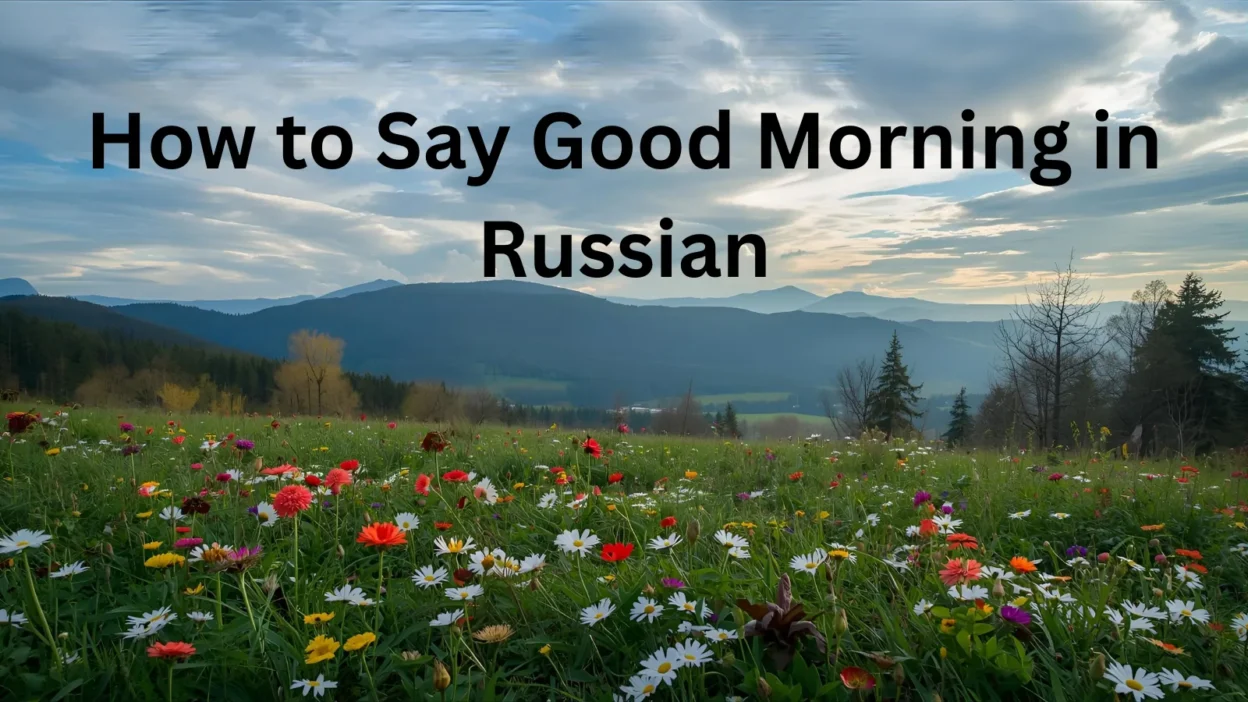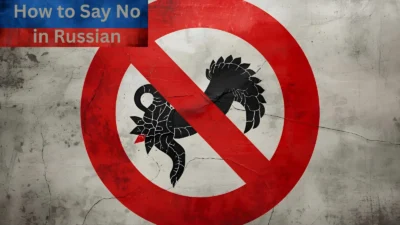Learning how to say good morning in Russian is a great way to start conversations with warmth and respect. The most common phrase is Доброе утро (Dobroye utro), which helps you greet others politely and naturally in Russian. Adding this phrase to your daily greetings will make your Russian sound more friendly and authentic.
You can also learn how to say good morning in Russian to a guy and how to say good morning in Russian to a girl for more personalized greetings.
Good Morning in Russian
Here are 15 ways to say good morning in Russian, complete with sample conversations and notes on when and where to use each one.
15 Phrases – How to Say Good Morning in Russian
| # | Russian Phrase | Pronunciation | Meaning / Usage |
|---|---|---|---|
| 1 | Доброе утро | Dobroye utro | Good morning (standard polite) |
| 2 | Утро доброе | Utro dobroye | Good morning (casual, reversed form) |
| 3 | С добрым утром | S dobrym utrom | Wishing you a good morning |
| 4 | Привет, доброе утро | Privet, dobroye utro | Hi, good morning (friendly) |
| 5 | Доброе утро, друг | Dobroye utro, drug | Good morning, friend |
| 6 | Доброе утро, мой друг | Dobroye utro, moy drug | Good morning, my friend |
| 7 | Доброе утро, красавица | Dobroye utro, krasavitsa | Good morning, beautiful (to a girl) |
| 8 | Доброе утро, красавчик | Dobroye utro, krasavchik | Good morning, handsome (to a guy) |
| 9 | Доброго утра | Dobrogo utra | Wishing you a good morning (alternative form) |
| 10 | Прекрасного утра | Prekrasnogo utra | Have a wonderful morning |
| 11 | Солнечного утра | Solnechnogo utra | Wishing you a sunny morning |
| 12 | Замечательного утра | Zamechatel’nogo utra | Wishing you an amazing morning |
| 13 | Доброе утро всем | Dobroye utro vsem | Good morning everyone |
| 14 | Утро доброе, коллеги | Utro dobroye, kollegi | Good morning, colleagues (workplace) |
| 15 | Доброе утро, любимый/любимая | Dobroye utro, lyubimyy/lyubimaya | Good morning, my love (to boyfriend/girlfriend) |
1. Доброе утро! (Dobroye utro!) — “Good morning!”

Origin:
This is the standard, most widely used phrase for “good morning” in Russian. “Доброе” means “good” (in neuter form), and “утро” means “morning.”
Example:
👤 User A: Доброе утро, Анна!
👤 User B: Доброе утро, Иван! Как спалось?
Use: Neutral to formal; appropriate in almost any setting.
2. Привет, доброе утро! (Privet, dobroye utro!) — “Hi, good morning!”
Origin:
Combines the informal “Привет” (“Hi”) with the formal “Доброе утро,” softening the tone for friendly encounters.
Example:
👤 User A: Привет, доброе утро! Уже завтракал?
👤 User B: Привет! Нет, только проснулся.
Use: Informal and friendly.
3. С добрым утром! (S dobrym utrom!) — “With a good morning!”

Origin:
A poetic or affectionate variation, often used in writing (like texts or messages) and by couples or close friends.
Example:
👤 User A: С добрым утром, солнышко!
👤 User B: Спасибо, милый! И тебе хорошего утра!
Use: Romantic or affectionate tone.
4. Добрейшего утра! (Dobreyshego utra!) — “The kindest morning to you!”
Origin:
A playfully exaggerated form of “Доброе утро,” often used in humorous or warm-hearted contexts.
Example:
👤 User A: Добрейшего утра, коллеги!
👤 User B: Вот это настрой! Доброе утро!
Use: Cheerful, informal, great for group chats or workplaces.
5. С утра пораньше! (S utra poranshe!) — “Up early in the morning!”

Origin:
An idiomatic expression used when someone is up early—especially unexpectedly.
Example:
👤 User A: Ого, ты уже на ногах?
👤 User B: Да, с утра пораньше дела!
Use: Informal, often with surprise or commentary.
6. Утро доброе, если оно доброе (Utro dobroye, yesli ono dobroye) — “Morning is good, if it is good.”
Origin:
A humorous or sarcastic Russian phrase reflecting a not-so-great morning—used in a joking tone.
Example:
👤 User A: Доброе утро!
👤 User B: Утро доброе, если оно доброе…
Use: Sarcastic or ironic tone.
7. Светлого утра! (Svetlogo utra!) — “Bright morning to you!”
Origin:
Poetic and uplifting, often found in inspirational messages or morning wishes.
Example:
👤 User A: Светлого утра, друзья!
👤 User B: Спасибо! И тебе отличного дня!
Use: Uplifting, used in writing or morning quotes.
8. Проснись и пой! (Prosnís’ i poy!) — “Wake up and sing!”
Origin:
A famous phrase from a Soviet-era film, used to playfully wake someone up or energize the start of a day.
Example:
👤 User A: Эй, спишь ещё? Проснись и пой!
👤 User B: Эх, рано ещё петь…
Use: Funny or theatrical; not literal.
9. С началом нового дня! (S nachalom novogo dnya!) — “With the beginning of a new day!”
Origin:
A more philosophical or reflective way to greet someone, highlighting the potential of a new day.
Example:
👤 User A: С началом нового дня, коллеги!
👤 User B: Да, пусть будет продуктивным!
Use: Semi-formal, thoughtful.
10. Как спалось? *(Kak spalós’?) — “How did you sleep?”
Origin:
Not a greeting by itself, but often used in place of “good morning” when speaking with someone you know well.
Example:
👤 User A: Как спалось?
👤 User B: Отлично, спасибо! Доброе утро!
Use: Informal, close relationships.
11. Доброе утречко! (Dobroye utrechko!) — “Good morningie!” (Diminutive)
Origin:
A cuter, more affectionate version of “Доброе утро.” Often used with children or in romantic settings.
Example:
👤 User A: Доброе утречко, котик!
👤 User B: Мурр… и тебе!
Use: Sweet, intimate, or playful tone.
12. Здравствуй, утро! (Zdravstvuy, utro!) — “Hello, morning!”
Origin:
A poetic or dramatic phrase often used in literature or when talking to oneself.
Example:
👤 User A: Здравствуй, утро нового дня.
👤 User B: Ты чего такой философ с утра?
Use: Literary or expressive.
13. Ну, доброе утро! (Nu, dobroye utro!) — “Well, good morning!”
Origin:
Tone-dependent—can sound cheerful or sarcastic, depending on context.
Example:
👤 User A: Ты наконец проснулся!
👤 User B: Ну, доброе утро и тебе…
Use: Casual, tone can imply teasing.
14. Солнышко, вставай! (Solnyshko, vstavai!) — “Sunshine, wake up!”
Origin:
Used with children or loved ones; “солнышко” (sunshine) is a common term of endearment.
Example:
👤 User A: Солнышко, вставай! Школа ждёт!
👤 User B: Ещё пять минут…
Use: Cute, affectionate, often with kids.
15. Чудесного утра! (Chudesnogo utra!) — “Have a wonderful morning!”
Origin:
More often used in written greetings—text messages, emails, or good morning posts.
Example:
👤 User A: Чудесного утра и отличного дня!
👤 User B: Спасибо! И тебе того же!
Use: Positive, uplifting; good for messages.
FAQs
1. How do you say good morning in Russian?
You say “Доброе утро” (pronounced dob-ro-ye oo-tra), meaning “good morning.”
2. Is Доброе утро formal or informal?
It’s used for both formal and informal situations, so you can say it to anyone.
3. How do I pronounce Доброе утро correctly?
Say it like “dob-roy-eh oo-tra” with a soft “oo” sound, spoken smoothly.
4. Can I shorten good morning in Russian?
Not really. Russians usually say the full phrase instead of a shorter version.
5. Can I use Доброе утро in the afternoon?
No. It is only used in the morning, typically until around noon.
6. Is there a casual way to say morning to friends?
Some people casually say “утро!” (meaning “morning!”), but it’s less common.
7. Do Russian people greet with a handshake in the morning?
Yes, especially in formal or business settings. Friends may also hug or nod.
8. Can I use Доброе утро in messages or texts?
Yes! You can write Доброе утро or send the Cyrillic phrase in chats.
9. Is good morning used daily in Russia?
Yes, Russians use it at home, work, school, and in public places.
10. What phrase should I learn next after good morning?
A good next phrase is “Здравствуйте” (zdravstvuyte), meaning “hello,” or “Как дела?” (kak de-LA), meaning “how are you?”
Conclusion:
Learning how to say good morning in Russian is more than just a greeting—it’s a way to show respect, kindness, and friendliness in daily conversations. Whether you’re speaking to a guy, a girl, or in a formal setting, phrases like Доброе утро (Dobroye utro) make your interactions more natural and authentic. Practice these variations to sound confident and polite while connecting with Russian speakers.

Liam Bennett is a dedicated content writer who creates clear, engaging, and well-structured articles.
He focuses on delivering practical information that is easy for readers to understand and apply.
Liam Bennett currently writes high-quality content for repliesnest.com, ensuring clarity and reliability.



